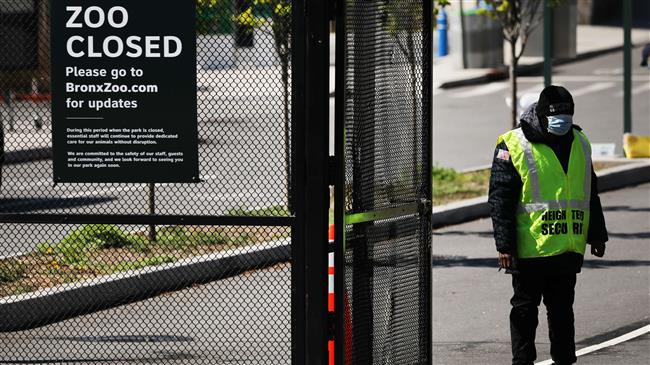
A guard stands at the entrance to the Bronx Zoo on April 6, 2020 in New York City. A tiger at the zoo has tested positive for COVID-19, the Wildlife Conservation Society said in a statement. (Photo by AFP)
American zoos and aquariums, closed to the public indefinitely by the novel coronavirus, have joined small businesses in seeking loans under the new federal Paycheck Protection Program.
As the going gets tough, zoos also are getting cute by deploying their best marketing tools-social-media appeals featuring animal videos-to encourage donations.
Closures have cut off revenue from admissions, gift shops and food services at what, for many of these nonprofit institutions, is the busiest part of the year. Meanwhile, zoos are stuck with heavy fixed costs to care for animals.
"Theyíre under incredible stress," said Dan Ashe, chief executive of the Association of Zoos and Aquariums. Even when there is no money coming in, he said, "the facility has to function at 100% to support the animals."
Zoos across the country said they have applied for the federally guaranteed paycheck loan program but donít know when they might receive funding. "Weíre in the pipeline," said Bert Castro, chief executive of the Phoenix Zoo.
Entities with 500 employees or fewer are eligible for the loans, carrying a 1% interest rate and designed to keep employees on the payrolls for eight weeks. If a borrower doesnít lay off workers, the government plans to forgive the loan, including interest. Borrowers may also use the money for rent and utilities.
At Zoo Atlanta, about 90% of revenue comes from sales of memberships, admissions, food and beverage, and gift shops, said Raymond King, chief executive officer. Mr. King said he is temporarily giving up his salary of $364,000 a year, and staff members have had pay cuts of 5% to 25%.
In normal times, the Shedd Aquarium in Chicago attracts about 1.9 million visitors a year. "Spring break is one of our peak visitation times," said Bridget Coughlin, chief executive. In March and April, revenue related to visitors is typically $1 million to $1.5 million a week. All of that has vanished, as stock-market investments in the aquariumís endowment have crashed.
In this "time of hibernation," Dr. Coughlin said, the priorities are to protect people and animals, conserve cash and look for opportunities. One of those opportunities was a pleasant surprise. In late March, the aquarium released a video of one of its penguins peering at beluga whales. It became a global sensation.
"It has been a megaphone for our mission," Dr. Coughlin said. "We now have social-media followers on all the continents, including Antarctica."
She said big donors have responded to pleas for extra help. The aquarium is also eager for small donations, she said, but understands that many people canít afford them now. Those who bought advance tickets have the option of getting refunds or donating the money. About 99% have asked for refunds, she said.
The Cincinnati Zoo & Botanical Garden is raising money by selling newly designed T-shirts featuring its star hippo, Fiona. The zoo also has daily video programs on Facebook and has raised more than $123,000 via a donate button that accompanies those postings.
"Thereís No Zoo Without You," declare new billboards from the Phoenix Zoo, pitching for donations. That zoo had to cancel a fundraising golf tournament but persuaded many of those who planned to participate to let the zoo keep their advance fees.
Another worry for zoos emerged April 4 when a Malayan tiger, which had been coughing, tested positive for the virus at the Bronx Zoo in New York. Other tigers and lions at the zoo were believed to have the virus as well. The zoo said it believes the virus was caught from a caretaker, who may have been asymptomatic. Other zoos around the country are looking at further precautions to avoid exposing animals to the virus.
Meanwhile, zoo keepers say some animals seem to miss interaction with visitors. In Phoenix, zoo keepers are trying to give more attention to goats used to being petted by visitors.
At the Pittsburgh Zoo & PPG Aquarium, tactics include sprinkling new scents, such as oregano or cinnamon, in animal quarters to keep them stimulated.
"Weíre trying to keep them mentally engaged, the same thing that parents of children and toddlers all across the country are doing," said Ginger Sturgeon, director of animal health at the Pittsburgh Zoo.
One animal attraction whose revenue has held up well during the current crisis is the Wildlife Safari in Winston, Ore. A petting zoo there had to be closed, but visitors can still drive through the park to gawk at cheetahs, elephants and other animals. Ticket sales for the week ended April 4 increased 30% from a year earlier.
(Source: Wall Street Journal)
LINK: https://www.ansarpress.com/english/15751
TAGS:






























 Farkhunda Buried, Ghani Appoints Fact-Finding Team
Farkhunda Buried, Ghani Appoints Fact-Finding Team




